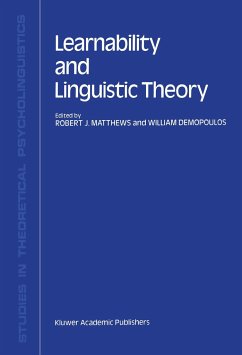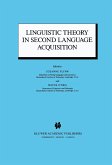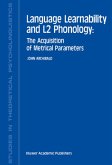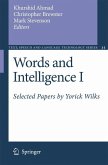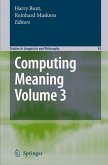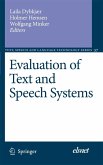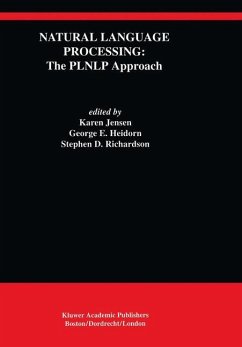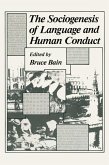The impetus for this volume developed from the 1982 University of Western Ontario Learnability Workshop, which was organized by the editors and sponsored by that University's Department of Philosophy and the Centre for Cognitive Science. The volume e~plores the import of learnability theory for contemporary linguistic theory, focusing on foundational learning-theoretic issues associated with the parametrized Government-Binding (G-B) framework. Written by prominent re searchers in the field, all but two of the eight contributions are pre viously unpublished. The editor's introduction provides an overview that interrelates the separate papers and elucidates the foundational issues addressed by the volume. Osherson, Stob, and Weinstein's "Learning Theory and Natural Language" first appeared in Cognition (1984); Matthews's "The Plausi bility of Rationalism" was published in the Journal of Philosophy (1984). The editors would like to thank the publishers for permission to reprint these papers. Mr. Marin Marinov assisted with the preparation of the indices for the volume. VB ROBERT 1. MATTHEWS INTRODUCTION: LEARNABILITY AND LINGUISTIC THEORY 1. INTRODUCTION Formal learning theory, as the name suggests, studies the learnability of different classes of formal objects (languages, grammars, theories, etc.) under different formal models of learning. The specification of such a model, which specifies (a) a learning environment, (b) a learn ing strategy, and (c) a criterion for successful learning, determines (d) a class of formal objects, namely, the class that can be acquired to the level of the specified success criterion by a learner implementing the specified strategy in the specified enviroment.
Hinweis: Dieser Artikel kann nur an eine deutsche Lieferadresse ausgeliefert werden.
Hinweis: Dieser Artikel kann nur an eine deutsche Lieferadresse ausgeliefert werden.
`The relation of formal learnability theory to linguistic theory has been a lively and important area of investigation over the past decade, leading to significant insights into the `fundamental problem of linguistic theory' -- how a child comes to acquire a language on the basis of experience. The papers in this volume, from the leading researchers in this field, show the level of sophistication discussions of learnability theory have attained. An important volume for all linguists, psychologists and philosophers concerned with the issues generated for acquisition from our contemporary views of human language.'
Robert May, University of California, Irvine
`Learnability Theory is one of the most promising approaches to understanding the nature of learning that has appeared in recent years. This eclectic collection provides an excellent overview of the issues that have captured the interest of contemporary scholars in that field, and provides a convenient entry for cognitive scientists interested in the age-old question of how learning is possible, particularly from a philosophical and linguistic perspective.'
Zenon W. Pylyshyn, Professor of Psychology and Computer Science, and, Director, Centre for Cognitive Science, University of Western Ontario, London, Canada
Robert May, University of California, Irvine
`Learnability Theory is one of the most promising approaches to understanding the nature of learning that has appeared in recent years. This eclectic collection provides an excellent overview of the issues that have captured the interest of contemporary scholars in that field, and provides a convenient entry for cognitive scientists interested in the age-old question of how learning is possible, particularly from a philosophical and linguistic perspective.'
Zenon W. Pylyshyn, Professor of Psychology and Computer Science, and, Director, Centre for Cognitive Science, University of Western Ontario, London, Canada
`The relation of formal learnability theory to linguistic theory has been a lively and important area of investigation over the past decade, leading to significant insights into the `fundamental problem of linguistic theory' -- how a child comes to acquire a language on the basis of experience. The papers in this volume, from the leading researchers in this field, show the level of sophistication discussions of learnability theory have attained. An important volume for all linguists, psychologists and philosophers concerned with the issues generated for acquisition from our contemporary views of human language.'
Robert May, University of California, Irvine
`Learnability Theory is one of the most promising approaches to understanding the nature of learning that has appeared in recent years. This eclectic collection provides an excellent overview of the issues that have captured the interest of contemporary scholars in that field, and provides a convenient entry for cognitive scientists interested in the age-old question of how learning is possible, particularly from a philosophical and linguistic perspective.'
Zenon W. Pylyshyn, Professor of Psychology and Computer Science, and, Director, Centre for Cognitive Science, University of Western Ontario, London, Canada
Robert May, University of California, Irvine
`Learnability Theory is one of the most promising approaches to understanding the nature of learning that has appeared in recent years. This eclectic collection provides an excellent overview of the issues that have captured the interest of contemporary scholars in that field, and provides a convenient entry for cognitive scientists interested in the age-old question of how learning is possible, particularly from a philosophical and linguistic perspective.'
Zenon W. Pylyshyn, Professor of Psychology and Computer Science, and, Director, Centre for Cognitive Science, University of Western Ontario, London, Canada

